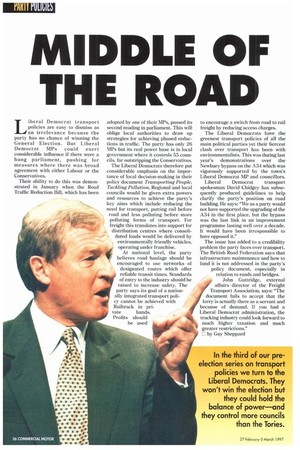MIDDLE OF
Page 38

If you've noticed an error in this article please click here to report it so we can fix it.
THE ROAD I4iberal Democrat transport policies are easy to dismiss as Jan irrelevance because the party has no chance of winning the General Election. But Liberal Democrat MPs could exert considerable influence if there were a hung parliament, pushing for measures where there was broad agreement with either Labour or the Conservatives.
Their ability to do this was demonstrated in January when the Road Traffic Reduction Bill, which has been adopted by one of their MPs, passed its second reading in parliament. This will oblige local authorities to draw up strategies for achieving phased reductions in traffic. The party has only 26 MPs but its real power base is in local government where it controls 55 councils, far outstripping the Conservatives.
The Liberal Democrats therefore put considerable emphasis on the importance of local decision-making in their policy document Transporting People, Tackling Pollution. Regional and local councils would be given extra powers and resources to achieve the party's key aims which include reducing the need for transport, putting rail before road and less polluting before more polluting forms of transport. For freight this translates into support for distribution centres where consoli dated loads would be delivered by , environmentally friendly vehicles, operating under franchise.
At national level, the party believes road haulage should be encouraged to use networks of designated routes which offer reliable transit times. Standards of entry to the industry should be raised to increase safety. The party says its goal of a nationally integrated transport policy cannot be achieved with Railtrack in pri vate hands.
Profits should to encourage a switch from road to rail freight by reducing access charges.
The Liberal Democrats have the greenest transport policies of all the main political parties yet their fiercest clash over transport has been with environmentalists. This was during last year's demonstrations over the Newbury bypass on the A34 which was vigorously supported by the town's Liberal Democrat MP and councillors.
Liberal Democrat transport spokesman David Chidgey has subsequently produced guidelines to help clarify the party's position on road building. He says: "We as a party would not have supported the upgrading of the A34 in the first place, but the bypass was the last link in an improvement programme lasting well over a decade. It would have been irresponsible to have opposed it."
The issue has added to a credibility problem the party faces over transport. The British Road Federation says that infrastructure maintenance and how to fund it is not addressed in the party's policy document, especially in relation to roads and bridges.
John Guttridge, external affairs director of the Freight Transport Association, says: "The document fails to accept that the lorry is actually there as a servant and because of demand. If you had a Liberal Democrat administration, the trucking industry could look forward to much higher taxation and much greater restrictions."
C by Guy Sheppard












































































































